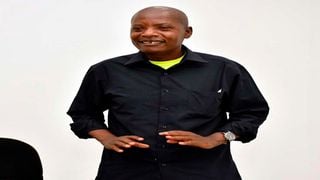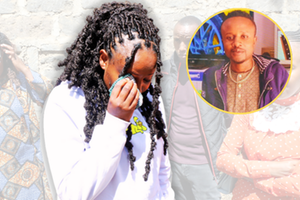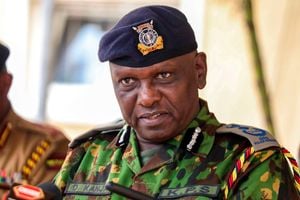
Lawyer Evans Machera, a cancer survivor, during an interview at Kenyatta University Teaching, Referral and Research Hospital on January 3, 2022.
| Francis Nderitu | Nation Media GroupNews
Premium
Evans Machera: Early diagnosis, positive attitude key to overcoming cancer
What you need to know:
- Doctors told him that he would need six cycles of chemotherapy, each three weeks apart.
- In March 2021, the big news was broken to him that there were no visible cancer cells in his body.
For 48 years, Evans Machera was a healthy man – when diseases attacked him, his immunity managed to knock them off like a charged buffalo would an enemy.
Now 50, his life changed at the end of 2019, when he started having an unusual recurring chest tightness. He saw a medic and was diagnosed with pneumonia, only that he was becoming frail by the day and the medicine seemed not to work.
“I live on the third floor of my apartment. Taking each flight of the staircase up to my house felt as though I was going against gravity,” he told the Nation in an interview yesterday.
“Everything felt heavy, even the lightest load. My wife helped me carry most of my luggage.”
He went for more medical checks and the doctors advised him to take an X-ray of his chest.
The X-ray did not reveal much but he was told that he needed pleural effusion – removal of excess fluid in his lungs and chest – and more tests, because his bill of health seemed clean, but his physique told a different story.
“I had the pleural effusion and the doctors suspected that I had either tuberculosis or HIV/Aids. I wanted answers badly and was ready to take all the tests.
“The doctors in the private hospital I went to were not sure what I was ailing from as the results of most tests based on their prognosis (the likely course of a medical condition) turned out negative.”
Hazy medical future
He was transferred to Moi Teaching and Referral Hospital (MTRH), where he was monitored closely.
“I was weak and stressed because all my diagnoses either came out normal or positive.”
However, one doctor, who told him that he could be having nasty pneumonia, recommended a biopsy, a medical procedure of removing a tissue from a body for further analysis).
The results came back a fortnight later and, for a moment, his medical future remained hazy.
“The doctors told me there could be something in my body that was yet to be known or understood.”
Using the same tissue extracted from his body, further analysis confirmed the worst suspicion – follicular lymphoma, a rare type of cancer that affects the lymphatic system.
“I was happy. Happy that finally the mystery of what had shut my body down had been revealed. It was in its earliest stage. I went home and told my family.
“That was hard news to take in. Good thing, they assured me of support and presence. They prayed for me and I let the doctors take over.
“For some reason, I knew I would be okay. My mindset was clear and I was always in good spirits.”
Even though he endured unbearable pain, not once did he feel lonely, as his family and friend’s bond with him grew tighter.
Six cycles of chemotherapy
“My family and friends were more worried than I was. Nothing interfered with my mindset. I knew I would get better even when people around me in the hospital ward died.”
Doctors told him that he would need six cycles of chemotherapy, each three weeks apart. Aware of the side effects that awaited him, he was a prepared chemo-candidate, ready to face the cancer drugs.
He transferred from MTRH to the Kenyatta University Teaching, Referral and Research Hospital (KUTRRH) during the fourth cycle.
“I had been told the fifth cycle would fell me. In fact, by the time I was in my second chemo, my hair had cleared and my hands had darkened.”
Not even the dreaded fifth cycle moved him. However, in his sixth and last cycle, he became a little bit tense.
“I became weak once again. I couldn’t eat and there were wounds in my mouth. Every time I was given medication, I vomited. The doctors did all they could and in no time, I was back on my feet and able to feed.”
His chemotherapy homestretch would have ended smoothly, but, amid all the chaos, he contracted Covid-19.
“It was scary but I was strong and I fought hard.”
In March 2021, the big news was broken to him and the ever smiling lawyer, who said he knew from day one that he would be healed from cancer, was told that there were no visible cancer cells in his body.
Awareness about cancer
He was to be monitored until September the same year at KUTRRH. A PET-CT scan machine helped provide a clear analysis of his condition.
His lactation dehydrogenase (LDH) at one time showed that it had gone up – this meant the cancer cells had multiplied faster. After some time, the LDH went down again. Now, the doctors maintain that he is free from cancer, a reality he knew from the start.
As the world spreads awareness about cancer every February 4, he reminds patients that a positive mindset is key.
“Just accept that you are sick, and then seek treatment and hope from above. God works through the doctors.”
Dr Tracy Irura, a radiation oncologist who has been attending to Mr Machera, told the Nation that this year’s theme – closing the cancer care gap – resonates with the goals the government is trying to achieve.
“We encourage people to go for early diagnosis, because a bad outcome for the patient is usually as a result of late diagnosis,” she said.
“With the sophisticated machines now available at the KUTRRH, people need not travel abroad for cancer treatment because the PET-CT scan is the gold standard for managing any type of cancer.”
Dr Irura believes that quality cancer care needs teamwork. The hospital has created a multidisciplinary team that discusses each patient and comes up with the best solutions for them.
“The country needs more healthcare workers in the oncology field. We also understand the patient’s financial burden and we try to match that with the treatment modalities. At the end of the day, it is the goal of care that we try to achieve.”





